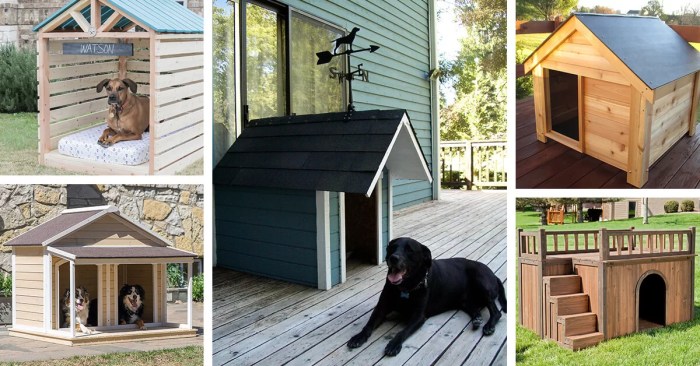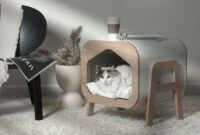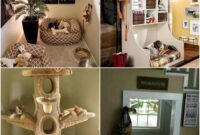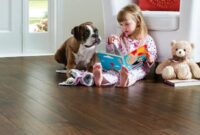Designing a home for dogs involves crucial considerations to ensure their safety and comfort. From indoor design elements to outdoor living spaces, this topic delves into creating a pet-friendly environment that meets the needs of your beloved companions.
Planning the Dog-Friendly Home: Designing A Home For Dogs

When designing a home for dogs, there are several key considerations that need to be taken into account to ensure the space is safe, comfortable, and suitable for our furry friends. It is important to create an environment that caters to the needs and habits of dogs while also integrating seamlessly into our daily lives.
Assessing the Needs and Habits of Dogs
Before embarking on designing a dog-friendly home, it is essential to assess the specific needs and habits of the dogs that will be living in the space. Consider factors such as the size and breed of the dog, their activity levels, any health conditions they may have, and their behavioral tendencies. This information will inform the design process and help create a living environment that is tailored to the needs of our canine companions.
Creating a Safe and Comfortable Space
Safety is paramount when designing a home for dogs. Ensure that the space is free of any hazards or toxic materials that could harm our furry friends. Consider incorporating features such as non-slip flooring, secure fencing, and designated areas for feeding, resting, and play. Additionally, providing comfortable bedding, appropriate temperature control, and access to natural light can contribute to a cozy and inviting environment for dogs to thrive in.
Designing for Functionality and Durability
When designing a dog-friendly home, it is important to prioritize functionality and durability. Choose materials and furnishings that are easy to clean and maintain, as dogs can be messy and may cause wear and tear over time. Opt for pet-friendly fabrics, stain-resistant surfaces, and furniture that can withstand the wear and tear of daily use by our four-legged friends. Incorporating features such as built-in storage for toys and accessories can also help keep the space organized and clutter-free.
Indoor Design Elements

When designing a home for dogs, it’s essential to consider the indoor design elements to ensure a comfortable and pet-friendly environment. Incorporating dog-friendly materials, organizing spaces effectively, and choosing durable furniture are key aspects to focus on.
Incorporating Dog-Friendly Materials
Using materials that are resistant to scratches, easy to clean, and safe for pets is crucial when designing the interior of a dog-friendly home. Opt for durable flooring options such as hardwood, laminate, or tile, as they are more resistant to wear and tear from pets. Avoid carpets that can trap pet hair and odors, making it challenging to maintain a clean environment. Choose non-toxic paints and finishes to ensure the safety of your furry friends.
Layout and Organization of Spaces
When planning the layout of your home, consider creating designated areas for your dogs to eat, sleep, and play. Incorporate built-in storage solutions for pet supplies to keep the space organized and clutter-free. Ensure that there are clear pathways for your pets to move around freely without any obstructions. Designate a cozy corner or a comfortable bed for your dogs to relax in different areas of the house.
Furniture Choices
Selecting furniture that is pet-friendly and durable is essential to create a functional and stylish living space. Choose fabrics that are easy to clean and resistant to stains, such as leather or microfiber. Opt for furniture with removable covers that can be washed or replaced if needed. Consider furniture with sturdy construction to withstand the wear and tear from pets, such as scratching or jumping. Incorporate pet-friendly features like built-in scratching posts or pet beds to blend seamlessly with the overall design of the home.
Outdoor Living Spaces

When designing outdoor living spaces for dogs, it is essential to create a safe and engaging environment where they can play, relax, and enjoy the outdoors. By incorporating pet-friendly elements and low-maintenance landscaping options, you can ensure that your furry friends have a comfortable and enjoyable space to spend time in.
Dog-Friendly Yard or Garden
Creating a dog-friendly yard or garden involves considering the needs and preferences of your canine companions. Some ideas to make your outdoor space more inviting for dogs include:
- Installing a sturdy fence to provide security and prevent your dogs from wandering off.
- Adding dog-friendly plants and grass that are safe for pets to interact with.
- Including shaded areas or a doghouse where dogs can rest and seek shelter from the sun.
- Setting up a designated play area with toys and agility equipment for exercise and mental stimulation.
Safe and Engaging Environment
To create a safe and engaging outdoor environment for dogs, consider the following tips:
- Remove toxic plants and materials that could be harmful to dogs if ingested.
- Provide access to fresh water at all times to keep dogs hydrated during outdoor playtime.
- Create pathways and designated areas for dogs to explore and roam freely without getting into trouble.
- Incorporate interactive elements like digging pits, sprinklers, or sensory gardens to stimulate your dogs’ senses and keep them entertained.
Pet-Friendly and Low Maintenance Landscaping
When choosing landscaping options for your outdoor space, opt for pet-friendly and low-maintenance features such as:
- Using gravel or mulch instead of grass to reduce maintenance and prevent muddy paw prints.
- Selecting durable and easy-to-clean materials for hardscaping elements like pathways and patios.
- Creating designated potty areas with artificial turf or gravel for easy cleanup and odor control.
- Adding raised garden beds or containers to protect plants from curious dogs and minimize digging behavior.
Special Features and Accessories

When designing a home for dogs, it’s essential to include special features and accessories that cater to their needs and enhance their living experience. From innovative amenities to technology integration, these additions can make a significant difference in your furry friend’s well-being.
Innovative Features
Including innovative features in your dog-friendly home can provide a unique and enjoyable experience for your pets. Consider installing automatic water dispensers, interactive toys, or even a doggie treadmill to keep them active and engaged throughout the day.
Dog-Specific Amenities
Adding dog-specific amenities like feeding stations, play areas, and cozy sleeping nooks can make your home a paradise for your furry companions. These amenities not only cater to their basic needs but also create a sense of comfort and security for your pets.
Technology Integration, Designing a home for dogs
Integrating technology into your home can help enhance the well-being of your pets. Consider installing smart pet cameras to monitor your dog while you’re away, automated feeding systems to ensure they are fed on time, or even a climate control system to keep them comfortable in all seasons. These technological advancements can make caring for your pets easier and more efficient.
Last Point

In conclusion, designing a home for dogs is a rewarding endeavor that enhances the well-being of your furry friends. By incorporating dog-friendly features and thoughtful design elements, you can create a space where your pets can thrive and enjoy a comfortable lifestyle.
- Pet-friendly furniture for homes: Enhancing comfort for pets and owners - January 6, 2025
- How to create a pet-friendly home: Tips for designing spaces, safety measures, routines, comfort, and relaxation - January 5, 2025
- Best flooring for pet-friendly homes: Choosing the Right Option - January 4, 2025




